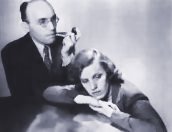
Kurt Weill and Lotte Lenya
Kurt Weill's Seven Deadly Sins (
Die sieben Todsünden) dates from 1933, the year he left Germany for Paris, after his music had been labeled "degenerate" by the Nazi's.
Originally, he had envisaged it as a Freudian psychological drama and asked Jean Cocteau to write the libretto. Cocteau turned it down, so Weill turned to his long-time collaborator Bertold Brecht. Brecht agreed on condition that he could use it to depict the corruption of the individual in a capitalist society. Rounding out the famous names, George Balanchine was the choreographer for the original production.
Brecht's story became one of the greatest satires of modern music. A young woman, represented by the practical Anna I (originally sung by Lotte Lenya) and the impulsive, flighty Anna II (danced by Tilly Losch) leaves her two brothers and parents and sets out on a journey through American cities to earn money for the family to build a house.
In each city Anna II succumbs to one of the Seven Deadly Sins, and has to be reined in by the sensible Anna I, so that their ultimate goal can be achieved. The massive irony is that this goal is by no means virtuous. To make their fortune, men are seduced, robbed, blackmailed and driven to suicide by the two Anna's.
Brecht's message is clear. Capitalist ambition is the greatest Deadly Sin, and ultimately, in a capitalist world, the wages of such sins is success.
Not surprisingly, having arrived in America, that notorious den of capitalism, Weill's new ballet was not a resounding success. He had much greater success in his lighter Broadway productions, especially
Lady in the Dark (1941, with Ira Gershwin),
One Touch of Venus (1943, with S.J. Perelman and Ogden Nash) and
Street Scene (1947, with Elmer Rice).
In fact, Weill suppressed his earlier German works to avoid harming his popular Broadway career by being seen as high-brow.
The Seven Deadly Sins was a work written for Lotte Lenya, Weill's wife, who was still a soprano in the 1930's. She became the custodian and champion of Weill's music after his death in 1950, and promoted his music till her death in 1981.
Lenya returned to Berlin in 1955 after a 20 year absence, and was heartbroken by the devastation of the city by the War.

Lotte Lenya
She made 2 recordings, the 1956
Sins and in 1955 the
Berlin Theatre Songs, a selection of songs from Weill's earlier German works, including
The Threepenny Opera and
Rise and Fall of the City of Mahogonny. They include such well-known pieces as
Mack the Knife and
Pirate Jenny, but also lesser known songs like the poignant
Ballad of the Drowned Girl from
Berlin Requiem and the compelling
Alabama-Song.
They were a great success of long-neglected works and led the Weill revival that continues to the present day, greatly influencing the opera/musical styles of Leonard Bernstein and Stephen Sondheim.
This is quintessential Weill; driving rhythms, discordant harmonies, and his unusual orchestrations. Sins is scored for soprano (Anna I), male singing quartet (the family) and a small instrmental ensemble, which includes accordian and banjo.
But it is Lotte Lenya's voice that sets her Weill recordings apart from all others. She first wanted to be a dancer and never formally trained as a singer. Her style is rough, earthy, almost amateur, emotional but never sentimental. By the 1950's, Lenya's voice was raspy and gravelly, a legacy of countless cigarettes, and this recording had to be transposed down by a fourth. If anything, this adds to the bittersweet but seedy tone of the whole work.
This remastered CD from Sony Classical generously couples both the
Sins and
Berlin Theatre Songs, with remarkably good sound given its 1950's origins. This is Kurt Weill in his original form, and in his native German and a better version of
Mack the Knife you will never hear. Lenya loves this music, and the music loves her. Her performance is raw but also vulnerable and human.
Had Sony included the libretto from the music, on the otherwise excellent booklet, we would have awarded this CD a 5 disc rating. As such, still a jewel, and an unsurpassed performance.
Please support Good-Music-Guide.com
by purchasing this CD using this link.

Track Listing
Kurt Weill
The Seven Deadly Sins (Die sieben Todsünden)
and Berlin Theatre Songs
Lotte Lenya
(1955 recording)
The Seven Deadly Sins
- Prologue: Andante sostenuto
- Idleness: Allegro vivace
- Pride: Allegretto, quasi andantino - Schneller Walzer
- Anger: Molto agitato
- Gluttony: Largo
- Lust: Moderato
- Avarice: Allegro giusto
- Envy: Allegro non troppo - Alla marcia, un poco tenuto
- Epilogue: Andante sostenuto
The Threepenny Opera (Die Dreigroschenoper)
- Mack the Knife (Moritat vom Mackie Messer)
- Barbara-Song
- Pirate Jenny (Seeräuberjenny)
The Rise and Fall of the City of Mahogony
Aufstief und Fall der Stadt Mahogany)
- Havanna-Lied
- Alabama-Song
- As You Make Your Bed (Denn Wie Man Sich Bettet)
Happy End
- Bilbao-Song
- Surabaya Johnny
- Sailor's Tango (Was die Herren Matrosen sagen)
Berlin Requiem (Das Berliner Requiem)
- Ballad of the Drowned Girl (Ballade Vom ertrunkenen Mädchen)
The Silverlake, A Winter's Tale
(Der Silbersee, Ein Wintermarchen)
- I am a Poor Relative (Lied der Fennimore)
- Ballad of Caesar (Cäsar Tod)